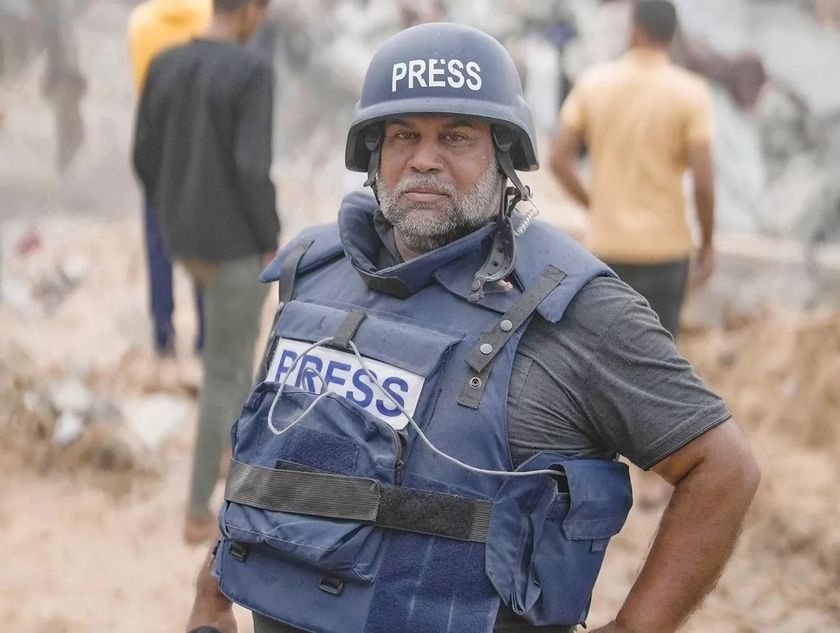With wide shoulders and grey hair, Wael al-Dahdouh suits the nickname Al-Jabal, the mountain of Gaza. Throughout years of war reporting, Al Jazeera’s bureau chief in the Strip has been pictured in a blue flak jacket with “PRESS” insignia, surrounded by rubble. But when I meet him in Amnesty’s headquarters in London, he wears a suit. After being wounded by an Israeli missile last year, he was evacuated for surgery in January 2024. His right hand is still in a metal brace.
At least 248 journalists have been killed by Israeli strikes in Gaza since October 2023, making it the deadliest conflict for journalists in history.
A few weeks into the war, Dahdouh was live on air when he learned that his wife, Amina, his teenage son, 7-year-old daughter and 18-month-old grandson had been killed in the bombardment of Nuseirat refugee camp, an Israeli-designated safe zone.
The camera followed Dahdouh to a nearby hospital, where he knelt by his wife’s body, in shock, and held her hand. By the time he reached his 15-year-old son and touched his face, he let out a cry and gasped the words: “They took revenge on us through our children.” Colleagues wanted to give him time to mourn but, a day after burying his family, he insisted on returning to reporting.
Last year, his eldest child Hamza—also a journalist—was killed in a targeted drone strike on a vehicle containing a group of reporters. “Hamza was not a part of me,” Dahdouh said at his son’s funeral, “he was all of me. He was the soul of my soul.”
The Israeli Defence Forces justified the attack by claiming that Hamza was a militant, which the family denies. This August, the Israeli-Palestinian +972 Magazine and Hebrew-language Local Call reported on a “legitimisation cell” established by the IDF after 7th October 2023, which was tasked with identifying journalists it could smear as undercover Hamas operatives.
The Committee for the Protection of Journalists has warned that Israel’s accusations are unfounded and intended “to manufacture consent to kill”. Dahdouh criticises the response of western media, which he thinks immediately “capitulated” to Israeli government lines.
He feels the sense of being abandoned by international colleagues was “more painful” than “the shootings, [or] being bombed systematically”.
“We are not mouthpieces for anybody… except the people on the ground,” says Dahdouh. His team worked to maintain 24-hour live coverage, he says, “so that nobody can accuse us of manipulating anything.”
Gazan journalists bear a “triple risk”. Risk to their own lives, to the safety of their loved ones, but also to the offices he describes as a “second home”. Before the war, in 2021, the IDF destroyed the building where Al Jazeera and other news outlets were headquartered.
Media workers are offered little protection: he cites the apparent “double-tap” attack on Nasser Hospital in August, which targeted a video camera and its operator, who was working for Reuters, and then killed more journalists and medical rescuers who rushed to the site in the aftermath. “We’re not naive—there are hundreds of surveillance drones in Gaza—they know exactly where we are.” But those who work “in the service of truth” know that “in our part of the world, there is a heavy price to pay,” Dahdouh says.
His tone is steady, but when trying to describe his emotional state, he reaches for the metaphor of a “volcano”, always in danger of erupting.
The IDF “don’t want any witnesses”, he says. His greatest fear is that one day “we’ll wake up and there will be no more people in Gaza”. That its people, history and geography will be “wiped out”. “Time is running out.”
Seemingly numbed to discussing his personal losses, only once, when he mentions his recently killed colleagues, do his eyes turn glossy and his voice breaks. The next moment, Dahdouh clears the feeling from his throat, steadies himself, and becomes the mountain once again.













